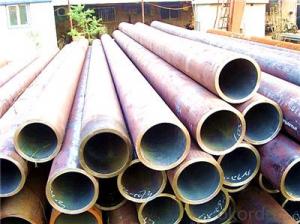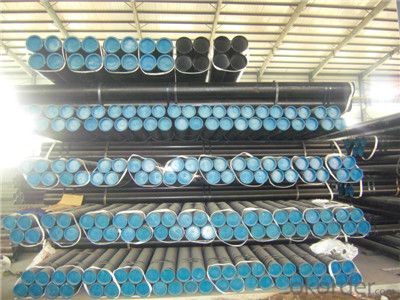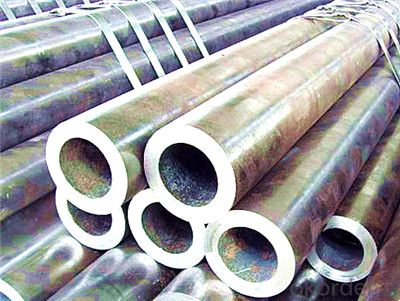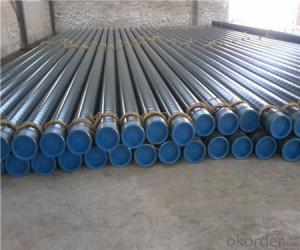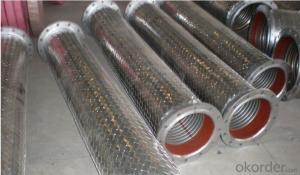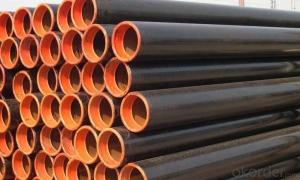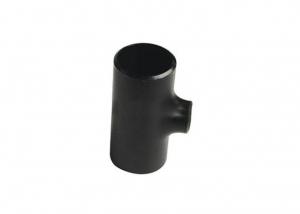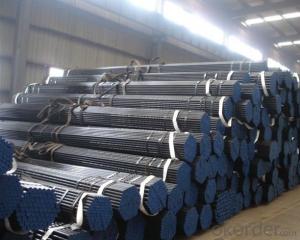Carbon Seamless Steel pipe with API-5678
- Loading Port:
- Tianjin
- Payment Terms:
- TT or LC
- Min Order Qty:
- 50 m.t.
- Supply Capability:
- 20000 m.t./month
OKorder Service Pledge
OKorder Financial Service
You Might Also Like
PRODUCT DETAILS
1.Structure of Carbon Seamless Steel pipe with API-5678 Description:
A large amount of Seamless Steel Pipes is offered to the clients at cost effective rates. These pipes are extremely durable, resistant to corrosion and have high tensile strength. Our pipes are used in nuclear plants, power plants, refineries and construction industry across the country. Furthermore, we are capable of providing these seamless pipes to the clients in bulk quantity.
2.Main Features of Carbon Seamless Steel pipe with API-5678:
• High manufacturing accuracy
• High strength
• Small inertia resistance
• Strong heat dissipation ability
• Good visual effect
•Reasonable price
3.Packaging & Delivery:
| Packaging Details: | Seaworthy packages, bundles wrapped with strong steel strip |
| Delivery Detail: | 15-30 days after received 30% TT |
4.Carbon Seamless Steel pipe with API-5678 Specification:
| Standard: | GB, DIN, ASTM,ASME, ASTM A106-2006, ASTM A53-2007 |
| Grade: | 10#,20#, 45#, 16Mn |
Thickness: | 8 - 33 mm |
| Section Shape: | Round |
| Outer Diameter: | 133 - 219 mm |
| Place of Origin: | Shandong, China (Mainland) |
| Secondary Or Not: | Non-secondary |
| Application: | Hydraulic Pipe |
| Technique: | Cold Drawn |
| Certification: | API |
| Surface Treatment: | factory state or painted black |
| Special Pipe: | API Pipe |
| Alloy Or Not: | Non-alloy |
| Length: | 5-12M |
| Outer Diameter: | 21.3-610mm |
5.Product pictures
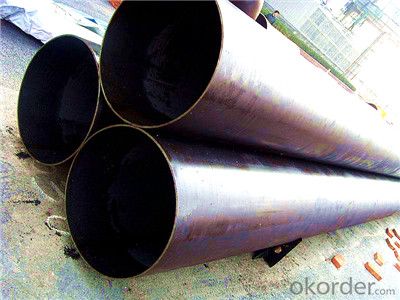
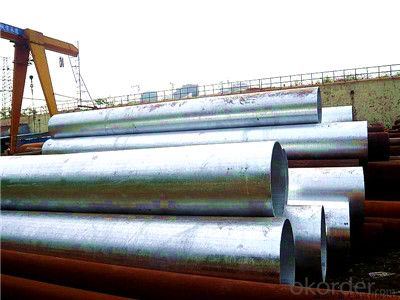
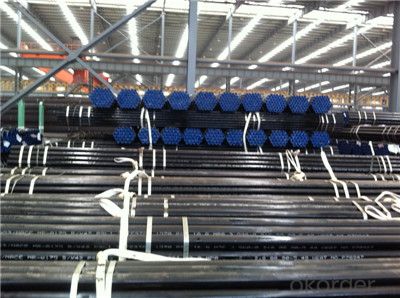
5.FAQ of Carbon Seamless Steel pipe with API-5678:
①How is the quality of your products?
Our products are manufactured strictly according to national and internaional standard, and we take a test
on every pipe before delivered out. If you want see our quality certifications and all kinds of testing report, please just ask us for it.
Guaranteed: If products’ quality don’t accord to discription as we give or the promise before you place order, we promise 100% refund.
②How about price?
Yes, we are factory and be able to give you lowest price below market one, and we have a policy that “ for saving time and absolutely honest business attitude, we quote as lowest as possible for any customer, and discount can be given according to quantity”,if you like bargain and factory price is not low enough as you think, just don’t waste your time.Please trust the quotation we would give you, it is professional one.
③Why should you chose us?
Chose happens because of quality, then price, We can give you both.Additionally, we can also offer professional products inquiry, products knowledge train(for agents), smooth goods delivery, exellent customer solution proposals.Our service formula: good quality+good price+good service=customer’s trust.
SGS test is available, customer inspection before shipping is welcome, third party inspection is no problem.
Any question, pls feel free to contact us !
- Q: What is the standard length of a steel pipe?
- The standard length of a steel pipe can vary depending on the application and industry, but commonly it ranges from 18 to 24 feet.
- Q: What are the advantages of using pre-fabricated steel pipes?
- Using pre-fabricated steel pipes in various applications has several advantages. Firstly, these pipes offer a high level of durability and strength due to the robustness and resistance of steel to external forces. This makes them ideal for withstanding high pressure or heavy loads, resulting in a longer lifespan compared to other materials and reducing the need for frequent replacements and maintenance. Secondly, pre-fabricated steel pipes provide excellent corrosion resistance by being coated with protective layers like galvanization or epoxy, preventing rusting and corrosion. This is especially important in industries or environments where the pipes may come into contact with moisture, chemicals, or other corrosive substances. By utilizing pre-fabricated steel pipes, the risk of leaks, deterioration, or failure due to corrosion is significantly reduced. Another advantage of these pipes is their versatility and ease of installation. They are manufactured to precise specifications before being delivered to the site, allowing for quick and efficient installation. Their modular nature enables easy assembly, disassembly, and reconfiguration, making them suitable for a wide range of applications. Additionally, pre-fabricated steel pipes can be seamlessly integrated with other building components, reducing installation time and costs. Furthermore, pre-fabricated steel pipes are more environmentally friendly compared to other materials. Steel is highly recyclable, and using pre-fabricated pipes reduces the consumption of natural resources and energy required for production. The long lifespan of steel pipes also reduces waste generation and the need for frequent replacements, contributing to sustainability efforts. Lastly, pre-fabricated steel pipes offer cost advantages. Although the initial cost may be higher than some other materials, their durability and low maintenance requirements result in long-term cost savings. The reduced need for repairs, replacements, and maintenance, along with the ease of installation, lead to lower overall project costs and reduced downtime. In summary, the advantages of pre-fabricated steel pipes include durability, corrosion resistance, versatility, ease of installation, environmental friendliness, and cost-effectiveness. These benefits make them the preferred choice for various industries and applications.
- Q: What's the material of Q325 steel pipe?
- Q235 refers to the material yield stress of 235MPa carbon steel, because of its low price, good machining and welding performance, it is generally used for welding structural parts. Of course, the unimportant parts can be used for it.
- Q: Are steel pipes suitable for underground chemical transport?
- No, steel pipes are not suitable for underground chemical transport as they can corrode and react with certain chemicals, posing safety risks and potentially contaminating the transported substances.
- Q: How do steel pipes handle water erosion?
- Steel pipes handle water erosion well due to their inherent strength and durability. The smooth surface of steel pipes helps to minimize friction and reduce the potential for erosion. Additionally, the corrosion-resistant nature of steel prevents rusting, ensuring long-term protection against water erosion.
- Q: How do you calculate the pipe pressure drop for steel pipes?
- To calculate the pipe pressure drop for steel pipes, you can use the Darcy-Weisbach equation or the Hazen-Williams equation. The Darcy-Weisbach equation is generally more accurate but requires more information. It takes into account the pipe diameter, length, roughness, fluid flow rate, and fluid properties such as viscosity and density. The equation is as follows: ΔP = (f * L * ρ * V^2) / (2 * D) Where: ΔP is the pressure drop f is the friction factor (which can be determined using Moody's chart or by using empirical equations such as the Colebrook-White equation) L is the pipe length ρ is the fluid density V is the fluid velocity D is the pipe diameter The Hazen-Williams equation is a simplified version that is commonly used for water flow calculations. It is less accurate but easier to use. The equation is as follows: ΔP = K * Q^1.85 / (C^1.85 * d^4.87) Where: ΔP is the pressure drop K is the Hazen-Williams coefficient (which depends on the pipe material and roughness) Q is the flow rate C is the Hazen-Williams roughness coefficient d is the pipe diameter It's important to note that these equations provide an estimate of the pressure drop, and actual conditions may vary due to factors such as fittings, bends, and valves in the pipe system. Additionally, it's crucial to ensure that the units used in the equations are consistent (e.g., using SI units or US customary units).
- Q: What is the creep resistance of steel pipes?
- The creep resistance of steel pipes refers to their ability to withstand deformation or elongation over time when subjected to high temperatures and constant stress. Steel pipes are known for their excellent creep resistance due to the inherent strength and stability of the material. The specific creep resistance of steel pipes can vary depending on factors such as the alloy composition, heat treatment, and the operating conditions they are exposed to. Creep is a phenomenon that occurs at elevated temperatures where materials slowly deform under constant stress. In the case of steel pipes, this can be a concern in applications where they are exposed to high temperatures for prolonged periods, such as in power plants, industrial furnaces, or steam pipelines. The resistance to creep deformation is crucial to ensure the structural integrity and longevity of the pipes. Steel pipes are often designed and manufactured with alloys that have high creep resistance properties, such as chromium-molybdenum (Cr-Mo) steels or nickel-based alloys. These alloys exhibit excellent mechanical strength, good thermal stability, and resistance to oxidation and corrosion, all of which contribute to their superior creep resistance. Furthermore, heat treatment processes like quenching and tempering can significantly enhance the creep resistance of steel pipes. These treatments involve controlled heating and cooling cycles that optimize the microstructure of the steel, increasing its resistance to deformation and improving its overall performance at high temperatures. It is important to note that the creep resistance of steel pipes is typically specified by industry standards and codes, such as the American Society of Mechanical Engineers (ASME) Boiler and Pressure Vessel Code. These standards define the allowable stress levels and design criteria for various steel pipe applications, ensuring that they meet the required safety and performance standards. In summary, steel pipes are known for their excellent creep resistance due to their inherent strength, stability, and resistance to high temperatures. The specific creep resistance of steel pipes can vary depending on factors such as alloy composition, heat treatment, and operating conditions. Proper design and adherence to industry standards are crucial to ensuring the desired creep resistance and overall performance of steel pipes in various applications.
- Q: Are steel pipes suitable for use in hydropower plants?
- Yes, steel pipes are suitable for use in hydropower plants. Steel pipes offer excellent durability, strength, and resistance to corrosion, making them ideal for transporting water or other fluids in hydropower systems. Additionally, steel pipes can withstand high pressure and provide efficient flow rates, ensuring reliable and efficient operation of the hydropower plant.
- Q: What are the common uses of steel pipes in construction?
- Due to their durability and strength, steel pipes are widely used in construction for various purposes. Plumbing systems in buildings commonly rely on steel pipes, which can effectively transport water, gas, and other fluids. Their resistance to corrosion and ability to withstand high pressure make them the preferred choice over alternative materials. Steel pipes are also frequently employed for structural support in construction. They serve as columns or beams, providing buildings with structural integrity and stability. With their capacity to support heavy loads, steel pipes are highly favored in the construction industry. Bridges and highways often incorporate steel pipes into their design. They are utilized to create sturdy and long-lasting bridge supports, guardrails, and signposts. The ability of steel pipes to endure extreme weather conditions and heavy traffic makes them a reliable option for infrastructure projects. Additionally, steel pipes are indispensable for underground utilities like sewer and drainage systems. They offer a robust solution for transporting wastewater and preventing leaks. Moreover, they play a crucial role in constructing underground tunnels and pipelines. Furthermore, steel pipes find application in fencing, scaffolding, and handrails in construction. Their strength, versatility, and ability to withstand harsh environmental conditions make them a preferred choice. In summary, steel pipes are vital components in construction due to their numerous advantages. Their durability, strength, and resistance to corrosion make them a reliable choice for various applications in the construction industry.
- Q: Can steel pipes be used for chimney flues?
- Yes, steel pipes can be used for chimney flues. Steel pipes are commonly used for chimney flues due to their durability, heat resistance, and ability to withstand high temperatures. They provide a reliable and efficient solution for venting smoke and gases from a fireplace or stove.
Send your message to us
Carbon Seamless Steel pipe with API-5678
- Loading Port:
- Tianjin
- Payment Terms:
- TT or LC
- Min Order Qty:
- 50 m.t.
- Supply Capability:
- 20000 m.t./month
OKorder Service Pledge
OKorder Financial Service
Similar products
Hot products
Hot Searches
Related keywords
